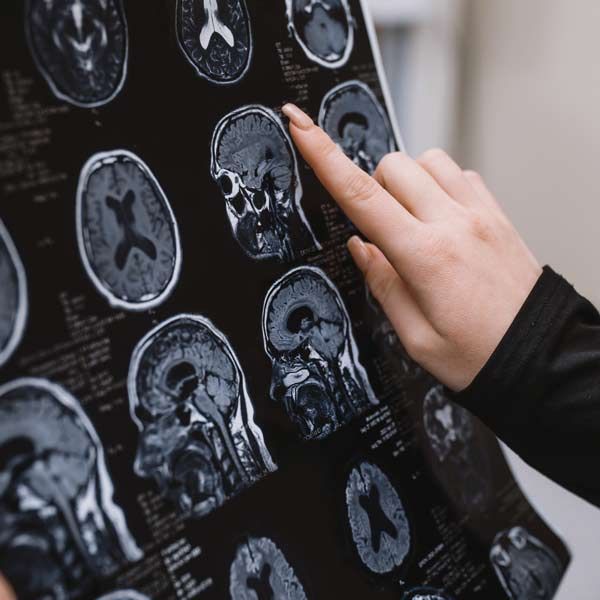Neurodegenerative Disease Treatments NYC - Dr. John Salerno

Complementary, Functional, and Integrative Neurodegenerative Condition Therapy by Salerno Wellness in Manhattan, NY, and Connecticut
I understand the profound impact that a neurodegenerative diagnosis can have on your life, affecting not just your physical health but your sense of self and your future. The symptoms you are experiencing can be frustrating and diminish your quality of life, leaving you feeling uncertain and unheard. With over 30 years of experience, my goal is to look beyond just managing symptoms and delve into the root causes of your condition. We will work together using complementary, functional, and integrative treatments to restore balance and improve your well-being.
-Dr. John Salerno
What are Neurodegenerative Conditions?
Neurodegenerative conditions are a group of disorders characterized by the progressive degeneration and death of nerve cells, known as neurons. This neuronal loss primarily affects the central nervous system, which includes the brain and spinal cord, leading to a gradual decline in cognitive and motor functions. These conditions are typically incurable and result in a progressive worsening of symptoms over time. The specific neurons that are affected determine the particular condition and its associated symptoms, from memory loss to movement difficulties.
The underlying mechanisms often involve protein misfolding, oxidative stress, and inflammation within the nervous system. Understanding these complex processes is key to developing effective management strategies. Ultimately, these diseases disrupt the intricate communication networks that control everything from our thoughts to our movements. Addressing the foundational imbalances contributing to this cellular decline is crucial for improving patient outcomes.
Types of Neurodegenerative Diseases
- Alzheimer's Disease - This is the most common form of dementia, characterized by the accumulation of amyloid plaques and tau tangles in the brain. It primarily affects memory, thinking, and behavior, with symptoms progressively worsening over time.
- Parkinson's Disease - This disorder affects movement, causing symptoms such as tremors, stiffness, and difficulty with balance and coordination. It is caused by the loss of dopamine-producing neurons in a specific area of the brain called the substantia nigra.
- Huntington's Disease - This is an inherited condition that causes the progressive breakdown of nerve cells in the brain. It results in a triad of motor, cognitive, and psychiatric symptoms, typically appearing in a person's 30s or 40s.
- Amyotrophic Lateral Sclerosis (ALS) - Also known as Lou Gehrig's disease, ALS is a rapidly progressive disease that attacks the nerve cells responsible for controlling voluntary muscles. This leads to muscle weakness, paralysis, and eventually respiratory failure.
- Multiple Sclerosis - This is a chronic disease of the central nervous system in which the immune system attacks the protective sheath (myelin) that covers nerve fibers. This damage disrupts communication between the brain and the rest of the body, causing a wide range of symptoms.
- Spinocerebellar Ataxia - This term refers to a group of genetic disorders characterized by progressive problems with movement and coordination. It primarily affects the cerebellum, the part of the brain that controls balance and motor control.
Common Symptoms
The symptoms of neurodegenerative conditions can vary widely depending on the specific disease and the area of the nervous system affected. Initially, signs may be subtle and easily dismissed, but they tend to become more pronounced as the condition progresses. These symptoms can impact movement, mental function, and the ability to perform daily activities, significantly affecting a person's independence and quality of life.
- Cognitive Decline and Memory Loss: This is a hallmark symptom of many neurodegenerative disorders, such as Alzheimer's disease. Patients may experience difficulty remembering recent events, struggle with problem-solving, and have trouble with language and executive functions like planning or organizing.
- Motor Impairments: Problems with movement are central to conditions like Parkinson's disease. This can manifest as tremors, stiffness (rigidity), slowness of movement (bradykinesia), and impaired balance, which can lead to frequent falls and difficulty with coordination.
- Mood and Behavioral Changes: Many individuals experience significant shifts in mood and personality. These can include depression, anxiety, apathy, irritability, and agitation, which are often as distressing for families as the physical symptoms.
- Speech and Swallowing Difficulties: Conditions affecting the brainstem and motor neurons can lead to slurred speech (dysarthria) and problems swallowing (dysphagia). These issues can impact communication and nutrition, increasing the risk of choking and aspiration pneumonia.
- Muscle Weakness and Atrophy: Diseases like Amyotrophic Lateral Sclerosis (ALS) cause the progressive weakening and wasting away of muscles. This eventually affects the ability to walk, speak, and even breathe as the muscles controlling these functions deteriorate.
Common Causes
The exact causes of most neurodegenerative conditions remain complex and are often multifactorial, involving a combination of genetic and environmental influences. While a small percentage of cases are directly inherited through specific gene mutations, the majority are considered sporadic, meaning they occur without a clear family history. Researchers believe that genetic predisposition can increase an individual's susceptibility, but environmental triggers often play a critical role in the disease's onset and progression.
These triggers can include exposure to toxins, pesticides, and heavy metals, which can induce oxidative stress and inflammation in the brain. Chronic inflammation, mitochondrial dysfunction, and an imbalance in gut microbiota are also increasingly recognized as significant contributing factors. Ultimately, these various elements converge to disrupt normal cellular processes, leading to the misfolding of proteins, neuronal damage, and the eventual death of nerve cells.

Candidates for Treatment by Dr. John Salerno
Ideal candidates for my approach to treating neurodegenerative conditions are individuals who are seeking more than just symptom management. Patients who are motivated to be active participants in their own health journey and are open to a holistic, integrative model of care often see the most benefit. This includes those who may have been told by conventional medicine that there are limited options available for them. My practice is suited for patients at various stages of their condition, from those with early signs to those with more advanced progression.
We focus on identifying and addressing the underlying root causes, such as chronic inflammation, toxicity, and metabolic imbalances. Therefore, anyone willing to explore comprehensive testing and embrace personalized diet, lifestyle, and advanced complementary therapies is a strong candidate for this functional medicine approach.
Related Medical Conditions to Neurodegenerative Conditions That Can Be Treated by Dr. Salerno
Many chronic health issues share underlying pathways with neurodegenerative conditions, such as systemic inflammation and metabolic dysfunction. Addressing these related conditions is a critical part of a comprehensive, integrative treatment plan. By improving overall health and reducing the body's total burden of stress, we can create a more supportive environment for the nervous system.
- Chronic Inflammation: This is a key driver in many chronic diseases and is heavily implicated in neurodegeneration. Conditions like arthritis, inflammatory bowel disease, and even cardiovascular disease are tied to a persistent inflammatory state that can be managed through diet, lifestyle changes, and targeted therapies.
- Mitochondrial Dysfunction: Mitochondria are the powerhouses of our cells, and their failure is linked to fatigue, muscle weakness, and cognitive decline. Treating this involves therapies aimed at enhancing cellular energy production and reducing oxidative stress, which can benefit overall vitality and neurological function.
- Heavy Metal Toxicity: The accumulation of heavy metals like mercury and lead can be highly toxic to the nervous system. A comprehensive detoxification program can help remove these harmful substances from the body, thereby reducing a significant source of neurological stress and damage.
- Gut Dysbiosis: An imbalance in the gut microbiome can lead to increased intestinal permeability, or "leaky gut," which triggers systemic inflammation that affects the brain. Restoring gut health through targeted probiotics, prebiotics, and dietary changes can help calm this inflammation and support cognitive function.
How Conventional Medicine Treats Neurodegenerative Conditions
Conventional medicine primarily focuses on managing the symptoms of neurodegenerative conditions, as there are currently no cures. The treatment approach typically involves pharmaceutical interventions designed to slow disease progression or alleviate specific symptoms. For example, in Alzheimer's disease, medications may be prescribed to temporarily improve memory and cognitive function by regulating neurotransmitters.
In Parkinson's disease, drugs that increase dopamine levels in the brain are used to manage motor symptoms like tremors and stiffness. Physical, occupational, and speech therapy are also standard components of care to help patients maintain independence for as long as possible. However, this approach often does not address the underlying biochemical and metabolic dysfunctions that contribute to the disease process. The focus remains on mitigating the effects of the disease rather than correcting the root causes of the neuronal damage.
How Dr. John Salerno Treats Neurodegenerative Conditions
At my practice, we treat neurodegenerative conditions by looking at the entire body as an interconnected system to identify and address the root causes of neuronal decline. My approach is deeply personalized, beginning with advanced diagnostic testing to uncover underlying issues like heavy metal toxicity, chronic infections, hormonal imbalances, and nutritional deficiencies. From there, we develop a comprehensive treatment plan that combines cutting-edge therapies with foundational lifestyle and dietary modifications.
This may include intravenous (IV) nutrient therapy to deliver high doses of vitamins and antioxidants directly to the cells, chelation therapy to remove toxic metals, and customized nutritional protocols to reduce inflammation and support brain health. We also focus on optimizing gut health and mitochondrial function, which are critical for neurological wellness. This functional and integrative strategy aims to create an internal environment that supports healing and can slow the progression of the disease.
Possible Side Effects of Treatment
The integrative and functional treatments I utilize are designed to be safe and enhance the body's natural healing capabilities, resulting in minimal side effects. Most therapies, such as IV nutrient infusions and dietary modifications, are well-tolerated and primarily associated with positive outcomes. Occasionally, patients undergoing detoxification protocols like chelation therapy may experience temporary, mild symptoms such as fatigue or headache as the body processes and eliminates toxins.
These effects are typically short-lived and are a sign that the treatment is working. We carefully monitor each patient throughout their treatment journey to manage any reactions and adjust protocols as needed. Our primary goal is to support the body's systems gently and effectively, ensuring patient comfort and safety at all times.
What Can Happen if Neurodegenerative Conditions Are Left Untreated?
If left untreated or managed only with conventional symptom-based approaches, neurodegenerative conditions will invariably progress, leading to a severe decline in function and quality of life. The gradual loss of neurons is relentless, resulting in worsening cognitive impairment, loss of motor control, and an increasing inability to perform daily activities independently. Patients may eventually require full-time care as they lose the ability to speak, swallow, walk, and care for themselves. This progression also places a significant emotional and financial burden on families and caregivers.
Complications such as malnutrition, falls, and pneumonia become more common, often leading to hospitalization and a shortened lifespan. Without intervention that addresses the root drivers of the disease, the devastating trajectory of neurodegeneration continues unchecked, culminating in complete dependency and a profound loss of personal autonomy.
Patient Case Study
A 62-year-old man named Robert came to my office with a recent diagnosis of early-stage Parkinson's disease, experiencing noticeable hand tremors, muscle stiffness, and a pervasive sense of fatigue that disrupted his daily life. Conventional treatment offered him medication, but he was concerned about side effects and wanted to address the underlying issues contributing to his condition. Our comprehensive testing revealed high levels of mercury toxicity, significant mitochondrial dysfunction, and severe gut dysbiosis.
We immediately started him on a personalized protocol that included IV chelation therapy to remove the heavy metals and high-dose glutathione drips to support his body's antioxidant defenses. We also implemented a targeted nutritional plan to heal his gut and prescribed supplements to boost mitochondrial energy production. Over the next six months, Robert's progress was remarkable; his tremors significantly subsided, his energy levels returned, and his overall sense of well-being improved dramatically. He was able to regain the fine motor skills needed to enjoy his hobbies again, a result he had been told was not possible.
Why Patients Choose Dr. John Salerno
Patients choose me because they are seeking a partnership in their health journey, one that goes beyond the limitations of conventional medicine. With over 30 years of experience in functional and integrative medicine, I offer a deep level of expertise in identifying and treating the complex root causes of chronic illness. People come to my practice because they want a physician who will listen carefully to their story and use advanced diagnostics to create a truly personalized treatment plan.
Patients are looking for hope and proactive solutions, not just the management of inevitable decline. My comprehensive approach, which combines innovative therapies with foundational health principles, empowers patients to take control of their well-being. They appreciate the focus on restoring health and vitality rather than simply masking symptoms with pharmaceuticals.
Contact Dr. John Salerno For A Consultation on Neurodegenerative Condition Treatment in NYC and CT
Navigating a neurodegenerative condition can feel overwhelming, but it is important to know that you have options beyond conventional symptom management. A functional medicine approach seeks to identify and correct the underlying imbalances—such as toxicity, inflammation, and metabolic dysfunction—that contribute to neuronal decline. By addressing these root causes, we can create a supportive internal environment that promotes healing and helps slow disease progression.
My goal is to restore your quality of life by improving both cognitive and physical function through a personalized, integrative treatment plan. You do not have to face this journey alone. Take the first step toward a more hopeful future and regain control of your health. Contact Salerno Wellness today to schedule a consultation and discover how our dedicated approach can make a meaningful difference in your life.
Please contact us today.
Additional References
- Neurodegenerative Diseases - National Institute of Environmental Health Sciences
- Neurodegenerative Diseases: An Overview of Environmental Risk Factors - National Library of Medicine



